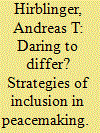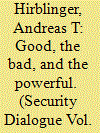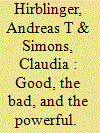|
|
|
Sort Order |
|
|
|
Items / Page
|
|
|
|
|
|
|
| Srl | Item |
| 1 |
ID:
174714


|
|
|
|
|
| Summary/Abstract |
‘Inclusion’ has emerged as a prominent theme in peacemaking. However, its exact meaning remains vague, as do assumptions about the relationship between inclusion and peace. This article seeks to problematize the research, policy and practice of inclusion. Focusing on United Nations (UN) peacemaking, we ask how the object of inclusion has been framed, and based on what strategies and underlying rationales. We do so against the backdrop of emerging debates about an agonistic peace, which suggest that violent antagonistic relationships can be overcome if peace processes enable contestation between adversaries. This requires that peacemakers recognize the constitutive role of difference in political settlements. We identify three distinct strategies for inclusion, with corresponding framings of the included. Firstly, inclusion can be used to build a more legitimate peace; secondly, to empower and protect specific actor groups; and thirdly, to transform the sociopolitical structures that underlie conflict. The first strategy frames the included in open terms that can accommodate a heterogeneity of actors, the second in closed terms pertaining to specific identity traits, and the third in relational terms emerging within a specific social, cultural and political context. In practice, this leads to tensions in the operationalization of inclusion, which are evidence of an inchoate attempt to politicize peace processes. In response, we argue for an approach to relational inclusion that recognizes the power relations from which difference emerges; neither brushing over difference, nor essentializing single identity traits, but rather remaining flexible in navigating a larger web of relationships that require transformation.
|
|
|
|
|
|
|
|
|
|
|
|
|
|
|
|
| 2 |
ID:
141460


|
|
|
|
|
| Summary/Abstract |
This article argues for a reflexive perspective on the ‘local’ in peacebuilding. While it is now widely acknowledged that anything local is complex, unstable, and relational, scholars continue to make truth claims about local actors and practices. This leads to an incomplete account of peacebuilding, as it conceals the powerful effects of representation, which shape our perspective on the local. We argue that the local is both used and produced through practices of representation, and that these representations serve to define what good peacebuilding entails. We consequently suggest a perspective on perspectives, which focuses on how representations of the local relate to political agendas in peacebuilding, and which can account for the effects of choosing one mode of representation over another. Through case studies from Burundi and South Sudan, we show that representations of the local are conflictingly produced by scholars, practitioners, and government officials, telling about the true, the good, and the bad local, empowering some and disempowering other actors, institutions, and practices. These dynamics have tangible effects on peace, conflict, and (in)security.
|
|
|
|
|
|
|
|
|
|
|
|
|
|
|
|
| 3 |
ID:
141779


|
|
|
|
|
| Summary/Abstract |
This article argues for a reflexive perspective on the ‘local’ in peacebuilding. While it is now widely acknowledged that anything local is complex, unstable, and relational, scholars continue to make truth claims about local actors and practices. This leads to an incomplete account of peacebuilding, as it conceals the powerful effects of representation, which shape our perspective on the local. We argue that the local is both used and produced through practices of representation, and that these representations serve to define what good peacebuilding entails. We consequently suggest a perspective on perspectives, which focuses on how representations of the local relate to political agendas in peacebuilding, and which can account for the effects of choosing one mode of representation over another. Through case studies from Burundi and South Sudan, we show that representations of the local are conflictingly produced by scholars, practitioners, and government officials, telling about the true, the good, and the bad local, empowering some and disempowering other actors, institutions, and practices. These dynamics have tangible effects on peace, conflict, and (in)security.
|
|
|
|
|
|
|
|
|
|
|
|
|
|
|
|
|
|
|
|
|